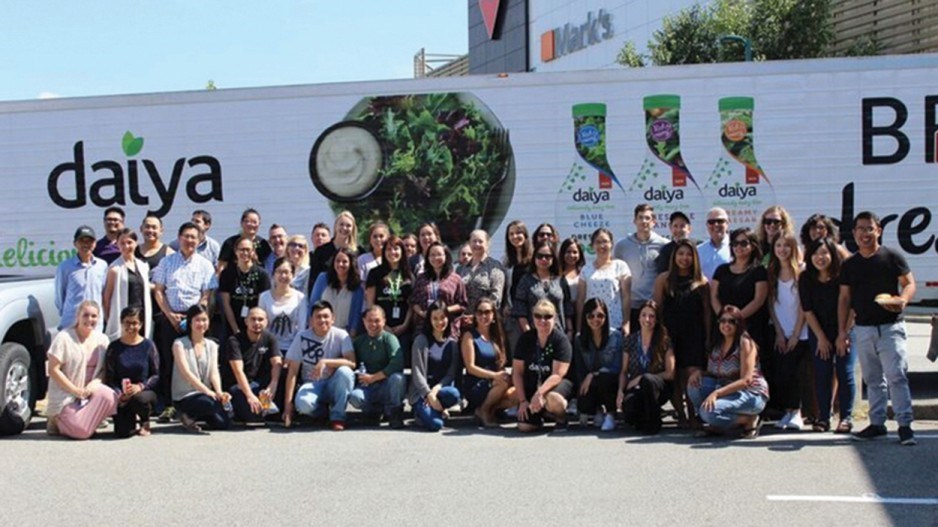While Business in Vancouver’s list of the top 100 corporate finance deals of 2017 was understandably tech-heavy, it also highlights rising interest in the specialty food sector, as two multimillion-dollar cross-border deals made their way into the top 10.
The two deals include the $405 million acquisition by Japan’s Otsuka Pharmaceutical Co. Ltd. of Vancouver-based Daiya Foods Inc., which makes dairy-free cheese and yogurt alternatives. Also on the list is Italian coffee conglomerate Lavazza Group spending $215 million to buy an 80% equity stake in Invermere’s Kicking Horse Coffee.
In both cases, major foreign corporate interest in the smaller B.C. counterparts points to a broader trend in emerging alternative consumer demands: Otsuka cited Daiya’s dairy-free market as highly attractive, while Lavazza noted Kicking Horse’s sustainability and fair-trade business model as a top reason for the tie-up.
“Today, organic fair-trade coffee is one of the fastest-growing trends at the international level, and in North America in particular,” Lavazza CEO Antonio Baravalle, who also takes over as Kicking Horse’s chairman, said in a statement. “Kicking Horse Coffee leads this segment with a brand that is perfectly complementary to the Lavazza portfolio.”
Daiya Foods vice-president of marketing and strategy Michael Lynch said that even before the company began seeking an investor (through investment bank Piper Jaffray), it had noticed a rise in overseas interest in the firm’s products, and that interest has persisted.
“A week does not go by where we do not receive an unsolicited inquiry from somewhere around the world – either a consumer, a distributor or a grocery store chain – asking us to import Daiya into their market,” Lynch said. “We’ve had to say no for such a long time because we didn’t have the resources, and, frankly, even right now, we cannot keep up with our demand in North America. So we absolutely believe there’s more demand out there.”
But interest from abroad alone isn’t enough; both companies said a willingness to expand beyond their comfort zones was crucial. Both Lynch and Kicking Horse co-founder Elana Rosenfeld have expressed the desire to expand their firms globally, and to use the resources gained in the recent M&A deals to facilitate that growth.
“Kicking Horse Coffee has always distinguished itself for its unrelenting commitment to quality coffee, along with strong sustainability values,” Rosenfeld said in a statement. “The Lavazza Group shares this vision and we now have the perfect partner to assist us in growing and connecting the world with our coffee.”
Rosenfeld has also said that Kicking Horse will look at Germany, Great Britain and Scandinavia as key new markets – undoubtedly aided by Lavazza’s European retail infrasructure – as well as places like Japan and Australia. Meanwhile, Daiya has noted that interest has come from as far as the Middle East, and Otsuka’s Asian links are an obvious potential opportunity.
“[Otsuka’s] focus has been curing people once they get sick, but they’ve also realized, with their own vision of improving health around the world, they can achieve that through nutrition, which can prevent people from being sick,” Lynch said. “What’s wonderful with Otsuka is that they do recognize the success we’ve enjoyed at Daiya – and we are incredibly humbled by that success, because we know it can all go away tomorrow – and they only want to help.”
There are potential challenges, however. When a small B.C. firm hooks up with a larger foreign company, it often needs to reassure its client base that its cultures and practices won’t be hurt by the bigger company’s involvement.
Daiya was especially sensitive to this issue, because its dairy-free products are favoured by vegan consumers who are often at odds with the animal-testing practices at pharmaceutical companies like Otsuka.
But Lynch said the acquisition will not change Daiya’s independence in its operational model and principles. He noted that the company’s entire management is staying, with Otsuka maintaining a learning role in the specialty food industry.
“They know they want to be more involved in the healthy-food space, and they have not been able to achieve the type of success they wanted to in the past,” Lynch said.
He added that consumers should not be worried about changes to what Daiya represents after the M&A deal.
“The very short answer is, there aren’t any concerns. Even though we work very closely with Otsuka as a wholly owned subsidiary, we are also independent. You will not see Otsuka on our packaging. From a consumer and retailer perspective, we have been, and will continue to be, Daiya Foods. All the philosophy we use in building the products, the ingredients that we use, which are all plant-based and non-GMO – none of that will change.”




